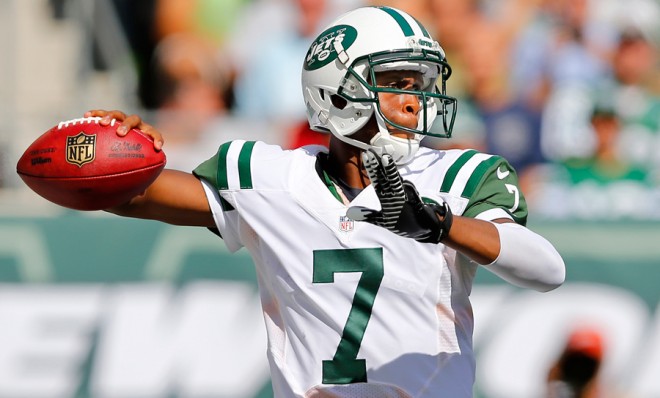Why young quarterbacks are taking over the NFL
The game has changed dramatically in the past few years


A free daily email with the biggest news stories of the day – and the best features from TheWeek.com
You are now subscribed
Your newsletter sign-up was successful
Last year, Robert Griffin III became the third-straight quarterback to win the NFL's Offensive Rookie of the Year Award.
Yet the position's dominance in post-season awards is something of a recent phenomenon, a reflection of the league's increasing reliance on young arms. Of the seven quarterbacks in NFL history to be named the game's top offensive rookie, six won the award in the past nine years.
While teams regularly slot top draft picks into the starting lineup, they have almost always relegated rookie passers to the bench, thinking they needed more time to develop before they could hack it at the pro level. Former top overall draft picks Carson Palmer, Michael Vick, and Eli Manning, among other notable QBs, all started their careers as backups.
The Week
Escape your echo chamber. Get the facts behind the news, plus analysis from multiple perspectives.

Sign up for The Week's Free Newsletters
From our morning news briefing to a weekly Good News Newsletter, get the best of The Week delivered directly to your inbox.
From our morning news briefing to a weekly Good News Newsletter, get the best of The Week delivered directly to your inbox.
That's all begun to change.
Last year, a record three rookie quarterbacks — Griffin, Andrew Luck, and Russell Wilson — all started playoff games. A record five rookie QBs started on opening day in 2012; no more than two had ever done so before in the same season.
That trend continued this year when the Jets on Sunday trotted out rookie Geno Smith to replace injured butt-fumbler Mark Sanchez. Smith threw for 256 yards, ran for 37 more, and the Jets won. Meanwhile, Bills rookie QB E.J. Manuel came within a last-second field goal of upsetting the New England Patriots in his pro debut.
Partly driving the shift toward young quarterbacks is the evolution of the college game, with college offenses becoming more like those at the pro level. Meanwhile, some NFL offenses have even begun to mimic collegiate tactics, such that the two leagues more closely resemble each other than in the past. That means new quarterbacks theoretically no longer need to sit and learn before they can be expected to run plays themselves.
A free daily email with the biggest news stories of the day – and the best features from TheWeek.com
Pro teams have also been more willing in recent years to entrust their offenses to quick-footed passers. Whereas immobile giants like Peyton Manning represent the ideal quarterback of yore, dual-threat options like Griffin and Vick before him have gained wider acceptance under tweaked offensive sets that give quarterbacks freedom to run if they so choose.
Money has also contributed to teams' evolving approach. (Football is, after all, a business.) The most recent collective bargaining agreement, reached before the 2011 season, dramatically reduced the compensation guaranteed to top draft picks, effectively making rookies far cheaper to sign and employ.
In 2010, the Rams guaranteed top pick Sam Bradford for $50 million. Two years later, the Colts needed less than half that, $22 million, to sign the number-one pick Luck.
The change has made it more reasonable for teams in need of QB help to consider starting a rookie or neophyte over a middle-of-the-road veteran who would command more money. As Grantland's Bill Barnwell noted, the confluence of cheap contracts and young talent in the past few years has begun to squeeze out middling veteran passers, forcing teams to weigh whether those older players are "worth keeping around."
Now, the cost of moving on and trying to acquire a real superstar isn't anywhere near as dramatic as it once was. A quarterback taken in the top five might be able to deliver elite performance at 10 percent of the price of a vested veteran, and if he fails, his contract is less than half of what it used to be. The success of atypical players like Griffin (who came from a unique college system) and Wilson (who was and likely still is short for a quarterback) also posits that there might be more successful quarterbacks coming out of college than there have been in the past. Paying for a veteran who will guarantee you average work without any possibility of being one of the league's very best quarterbacks seems more and more ill-advised in the process. [Grantland]
Luck and Griffin will each make about $5 million this year, and Wilson is due around $700,000. On the other hand, Joe Flacco is making an average $20.6 million per year under his new contract. Yes, Flacco won a Super Bowl, but he has been statistically average his entire career.
With vaunted quarterbacks like Louisville's Teddy Bridgewater on the way, the NFL will likely see even more young passers on the field in the near future. Not all of them will fare as well as Luck and company, but their mere presence will reaffirm the new, youth-centric era of NFL passers.
Jon Terbush is an associate editor at TheWeek.com covering politics, sports, and other things he finds interesting. He has previously written for Talking Points Memo, Raw Story, and Business Insider.
-
 The Olympic timekeepers keeping the Games on track
The Olympic timekeepers keeping the Games on trackUnder the Radar Swiss watchmaking giant Omega has been at the finish line of every Olympic Games for nearly 100 years
-
 Will increasing tensions with Iran boil over into war?
Will increasing tensions with Iran boil over into war?Today’s Big Question President Donald Trump has recently been threatening the country
-
 Corruption: The spy sheikh and the president
Corruption: The spy sheikh and the presidentFeature Trump is at the center of another scandal
